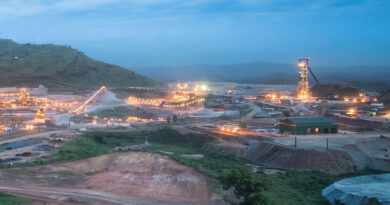Anglogold Ashanti made solid progress but there is still much to do
Anglogold Ashanti says its key strategic objectives include improvement of overall sustainability performance, particularly the safe operation of its mines; strengthening its balance sheet; increasing Ore Reserve through exploration and growth projects; ensuring tight management of costs to improve cash flow; and streamlining its portfolio to direct capital to higher-return projects.
Maria Ramos, Anglogold Ashanti Chairperson said: “We made solid progress on most of these metrics. We sold our operating assets in South Africa and Mali, more than halved our net debt to the lowest level in more than 10 years, added six million ounces of new reserves to extend the life of our portfolio, and increased free cash flow almost fivefold, to $743m.
“Phase 2 of the Obuasi redevelopment was 90% complete at the end of the year, while the feasibility studies on our two Colombia projects made good progress toward completion. Dividends were up fivefold after a decision to double the payout ratio.That is a solid performance but we’re mindful that there is much to do to narrow the value gap that persists with many of our international gold-mining peers.
“Obuasi must reach its ramp-up milestones during 2021, and the board must make investment decisions on the Gramalote and Quebradona projects, after reviewing their feasibility studies and detailed execution plans.
“We are also especially focused on cost management and capital discipline, particularly amidst the reinvestment programme in our ore bodies given a potentially stagnant, or declining gold price.”
Anglogold Ashanti cash conversion is below par and improving it is a focus for the board. In this regard, the management team continues to work on ways to ensure the release of growing cash balances in the Democratic Republic of Congo, value added tax balances in Tanzania and export levy rebates in Argentina. Together, these three areas accounted for $586m at the end of 2020.
Safety is another area where improvement is required. The company had reported six fatalities during 2020 – four at the South Africa operations which have now been sold, and two at its Obuasi mine in Ghana.
On environment, sustainability and governance Ramos said: “Mitigating our impact on the environment – and climate change in particular — is non-negotiable. Work is underway to reduce the use of scarce resources such as land and water, and to limit greenhouse gas emissions. We’ve been doing that for some time, reducing total GHG emissions by 48% since 2008, and recycling 76% of water use.” Anglogold Ashanti is the third-largest gold producer globally and the largest on the African continent, producing 3.047Moz of gold and employing an average of 36,952 people (including contractors) in 2020 with market capitalisation of $9.4bn as at 31 December 2020.




